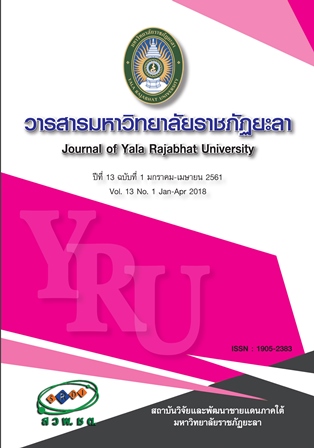ผลของการพัฒนาความรู้ในการบูรณาการเทคโนโลยีกับวิธีสอนและเนื้อหาที่สอน (TPACK) ของนักศึกษาครูสาขาวิชาคณิตศาสตร์ที่มีต่อผลสัมฤทธิ์ทางการเรียนคณิตศาสตร์ของนักเรียน
Main Article Content
บทคัดย่อ
เทคโนโลยีเป็นเครื่องมือทางปัญญาที่มีประสิทธิภาพในการช่วยทำให้การถ่ายทอดเนื้อหาคณิตศาสตร์ที่มีความเป็นนามธรรมมีความเป็นรูปธรรมมากขึ้น งานวิจัยนี้มีวัตถุประสงค์เพื่อศึกษาระดับความรู้ในการบูรณาการเทคโนโลยีกับวิธีสอนและเนื้อหาที่สอน (TPACK) ของนักศึกษาครูคณิตศาสตร์ในระหว่างการฝึกประสบการณ์วิชาชีพครู และศึกษาผลสัมฤทธิ์ทางการเรียนที่เกิดขึ้นกับผู้เรียน กลุ่มตัวอย่างเป็นนักศึกษาครูชั้นปีที่ 5 สาขาวิชาคณิตศาสตร์ มหาวิทยาลัยราชภัฏยะลา จำนวน 3 คน และนักเรียนที่นักศึกษาครูรับผิดชอบสอนในระหว่างการฝึกประสบการณ์วิชาชีพครู จำนวน 6 กลุ่ม (192 คน) นักศึกษาครูแต่ละคนทำการสอนกลุ่มทดลองและกลุ่มควบคุมในเนื้อหาคณิตศาสตร์ที่ต่างกัน แล้วทำการวัดผลสัมฤทธิ์ทางการเรียนของนักเรียนผู้วิจัยใช้การวิเคราะห์ข้อมูลเชิงคุณภาพโดยใช้วิธีการวิเคราะห์เนื้อหาเพื่อวิเคราะห์ระดับ TPACK ของนักศึกษาครูตามเกณฑ์ของตัวแบบการพัฒนา TPACK (TPACK Developmental Model) และใช้การวิเคราะห์ข้อมูลเชิงปริมาณโดยใช้สถิติ Dependent sample t-test และ Independent sample t-test เพื่อเปรียบเทียบคะแนนผลสัมฤทธิ์ทางการเรียนของนักเรียนกลุ่มทดลองและกลุ่มควบคุมก่อนและหลังการเรียน ผลการวิจัยพบว่า มีนักศึกษาครูจำนวน 2 คน ที่มีระดับ TPACK อยู่ในระดับที่ 4 การสำรวจ (Exploring) และอีก 1 คน มีระดับ TPACK อยู่ในระดับที่ 5 การพัฒนา (Advancing) ซึ่งถือว่าอยู่ในเกณฑ์ที่ดี เมื่อพิจารณาผลสัมฤทธิ์ทางการเรียนคณิตศาสตร์ของนักเรียนพบว่า ค่าเฉลี่ยคะแนนผลสัมฤทธิ์ทางการเรียนของนักเรียนกลุ่มทดลองทั้ง 3 กลุ่มก่อนเรียนและหลังเรียนแตกต่างกันอย่างมีนัยสำคัญทางสถิติที่ระดับ .01 โดยมีค่าเฉลี่ยคะแนนผลสัมฤทธิ์หลังเรียนสูงกว่าก่อนเรียน นอกจากนี้ค่าเฉลี่ยคะแนนผลสัมฤทธิ์ทางการเรียนของนักเรียนในแต่ละเนื้อหาของกลุ่มทดลองและกลุ่มควบคุมแตกต่างกันอย่างมีนัยสำคัญทางสถิติที่ระดับ .01 โดยมีค่าเฉลี่ยคะแนนผลสัมฤทธิ์ของกลุ่มทดลองสูงกว่ากลุ่มควบคุมในทุก ๆ เนื้อหา ผลการวิจัยชี้ให้เห็นว่าการบูรณาการเทคโนโลยีในการจัดการเรียนการสอนส่งผลให้นักเรียนเกิดการเรียนรู้ที่มีประสิทธิภาพ
Article Details
บทความ ข้อมูล เนื้อหา รูปภาพ ฯลฯ ที่ได้รับการเผยแพร่ในวารสารมหาวิทยาลัยราชภัฏยะลานี้ ถือเป็นลิขสิทธิ์ของวารสารมหาวิทยาลัยราชภัฏยะลา หากบุคคลหรือหน่วยงานใดต้องการนำทั้งหมดหรือส่วนหนึ่งส่วนใดไปเผยแพร่ต่อหรือกระทำการใดๆ จะต้องได้รับอนุญาตเป็นลายลักษณ์อักษรจากวารสารมหาวิทยาลัยราชภัฏยะลาก่อนเท่านั้น
เอกสารอ้างอิง
pedagogical and content knowledge (TPACK) in three southernmost provinces, Thailand.
SCOPUS Indexed AIP Conference Proceedings of the 4th International Conference
on Research, Implementation and Education of Mathematics and Science, 1868(1),
050032-1-050032-7.
2.Erdogan, A. & Sahin, I. (2010). Relationship between math teacher candidates’ Technological
Pedagogical and Content Knowledge (TPACK) and achievement levels. Procedia -
Social and Behavioral Sciences, 2(2), 2707-2711.
3.Eyyam, R. & Yaratan, H. S. (2014). Impact of use of technology in mathematics lessons on
student achievement and attitudes. Social Behavior and Personality, 42(Suppl.), S31-S42.
4.Groff, J. & Mouza, C. (2008). A framework for addressing challenges to classroom technology
use. AACE Journal, 16(1), 21-46.
5.Idris, N. (2009). The impact of using Geometers’ Sketchpad on Malaysian students’ achievement
and van Hiele geometric thinking. Journal of Mathematics Education, 2(2), 94-107.
6.Jimoyiannis, A. (2010). Designing and implementing an integrated technological pedagogical
science knowledge framework for science teacher professional development. Computer
& Education, 55(3), 1259-1269.
7.Lawless, K. & Pellegrino, J. W. (2007). Technology into teaching and learning: knowns, unknowns,
and ways to pursue better questions and answers. Review of Educational Research,
77(4), 575–614.
8.Mishra, P. & Koehler, M. J. (2006). Technological pedagogical content knowledge: a framework
for teacher knowledge. Teachers College Record, 108(6), 1017-1054.
9.Mouza, C., Karchmer-Klein, R., Nandakumar, R., Ozden, S. Y. & Hu, L. (2014). Investigating the
impact of an integrated approach to the development of preservice teachers’
technological pedagogical content knowledge (TPACK). Computer & Education, 71,
206-221.
10.Niess, M. L., Ronau, R. N., Shafer, K. G., Driskell, S. O., Harper, S. R., Johnston, C., et al. (2009).
Mathematics teacher TPACK standards and development model. Contemporary Issues
in Technology and Teacher Education (CITE Journal), 9(1), 4-24.
11.Norton, S., McRobbie, C. J. & Cooper, T. J. (2000). Exploring secondary mathematics teachers’
reasons for not using computers in their teaching: five case studies. Journal of Research
on Computing in Education, 33(1), 87.
12.Pelgrum, W. (2001). Obstacles to the integration of ICT in education: results from a worldwide
educational assessment. Computers and Education, 37(2), 163-178.
13.Shamburg, C. (2004). Conditions that inhibit the integration of technology for urban early
childhood teachers. Information Technology in Childhood Education Annual, 2004(1),
227- 244.
14.Shulman, L. S. (1986). Those who understand: Knowledge growth in teaching. Educational
Researcher, 15(2), 4-14.
15.Srisawasdi, N. (2012). The role of TPACK in physics classroom: case studies of preservice
physics teachers. Procedia - Social and Behavioral Sciences, 46, 3235-3243.


